在 Spring Boot 中构建同步电子邮件通知系统:分步指南
- PHPz原创
- 2024-09-08 18:30:33711浏览
探索 Spring Boot 应用程序中同步电子邮件传送的基础知识
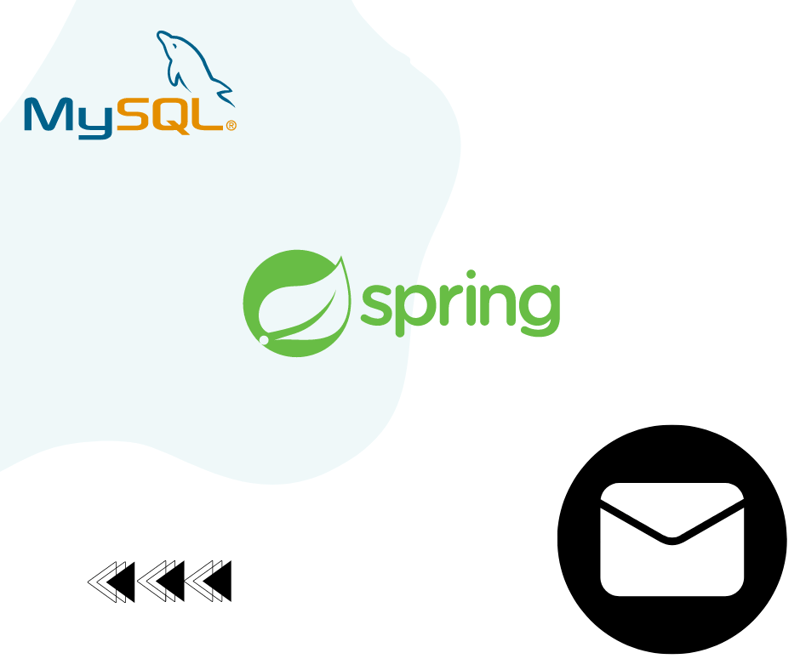
在当今快节奏的数字世界中,及时通信对于任何应用程序都至关重要。无论是密码重置、欢迎消息还是订单确认,电子邮件通知在增强用户体验方面都发挥着至关重要的作用。作为开发人员,我们经常发现自己遇到这样的情况:从 Spring Boot 应用程序发送电子邮件通知不仅是一项要求,而且是必要的。
在本博客系列中,我将指导您完成在 Spring Boot 应用程序中实现电子邮件通知的过程。我们将从基础知识开始——使用同步方法发送电子邮件。此方法可确保在执行请求期间立即发送电子邮件,为用户提供即时反馈。
虽然同步方法易于实现并且对于较小的应用程序也很有效,但了解其局限性非常重要,特别是在性能可能受到影响的高流量环境中。
在这一部分中,我们将重点关注设置项目、配置必要的依赖项以及编写代码来发送基本的电子邮件通知。在本文结束时,您将拥有一个能够同步发送电子邮件的工作 Spring Boot 应用程序,为本系列后续部分中的更高级主题奠定基础。
项目设置
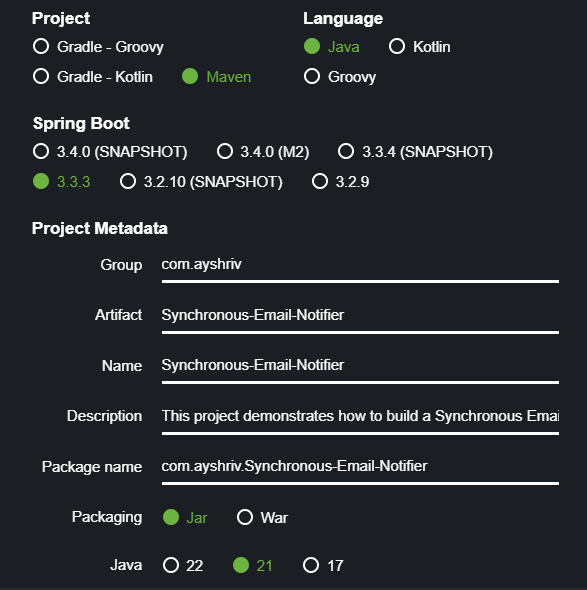
设置依赖关系
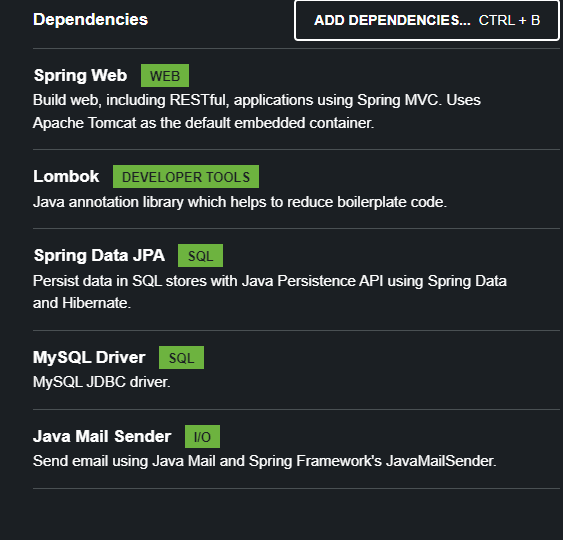
pom.xml 文件中的依赖项
Spring Boot 入门数据 JPA
神器:spring-boot-starter-data-jpa
描述:此依赖项使用 JPA (Java Persistence API) 简化了数据持久性。它提供了与数据库交互所需的一切,包括实体、存储库和事务。在此项目中,它允许您轻松地从 MySQL 数据库保存和检索用户数据(例如电子邮件日志、用户信息)。
Spring Boot 入门邮件
神器:spring-boot-starter-mail
描述:此启动器允许从 Spring Boot 应用程序发送电子邮件。它包括必要的组件,例如 JavaMailSender,用于配置和发送注册和订单确认等用户活动的实时电子邮件通知。
*Spring Boot 入门网站
*
神器:spring-boot-starter-web
描述:此依赖项可帮助您构建 RESTful Web 服务并提供 Web 内容。它引入了 Spring MVC 等用于创建 API 的基本库。在此项目中,它允许创建端点以通过 HTTP 请求触发电子邮件通知。
MySQL 连接器
神器:mysql-connector-j
描述:这是将 Spring Boot 应用程序连接到 MySQL 数据库所需的 JDBC 驱动程序。它允许应用程序与数据库交互并执行读取和写入数据等操作,例如存储电子邮件日志或用户信息。
龙目岛
神器:龙目岛
描述:Lombok 是一个方便的库,它通过自动生成 getter、setter 和构造函数等常用方法来减少样板代码。在本项目中它被标记为可选,它的使用可以简化 User 或 EmailLog 等数据模型的代码。
Spring Boot 入门测试
神器:spring-boot-starter-test
描述:此依赖项为 Spring Boot 应用程序提供了全面的测试框架。它包括用于单元和集成测试的 JUnit、Mockito 和 Spring Test 等库。它有助于确保您的电子邮件通知系统通过自动化测试按预期工作。
Spring Boot Maven 插件
神器:spring-boot-maven-plugin
描述:该插件允许您从 Maven 命令构建和运行 Spring Boot 应用程序。它简化了将项目打包到可执行 JAR 文件的过程,使部署更加容易。如有必要,它会从构建过程中排除 Lombok 依赖项。
配置应用程序属性
要将 Spring Boot 应用程序连接到电子邮件服务器,您可以使用必要的 SMTP 设置来配置 application.properties 或 application.yml 文件。以下是每种配置格式的示例。
对于 application.properties
spring.application.name=Synchronous-Email-Notifier server.port=8080 spring.datasource.url=jdbc:mysql://localhost:3306/synchronous_email_notifier spring.datasource.username=root spring.datasource.password=ayush@123 spring.jpa.hibernate.ddl-auto=update spring.jpa.show-sql=true spring.mail.host=smtp.gmail.com spring.mail.port=587 spring.mail.username=shri@gmail.com spring.mail.password= spring.mail.properties.mail.smtp.auth=true spring.mail.properties.mail.smtp.starttls.enable=true
对于 application.yml
spring:
mail:
host: smtp.example.com
port: 587
username: your-email@example.com
password: your-email-password
properties:
mail:
smtp:
auth: true
starttls:
enable: true
主机:这是 SMTP 服务器地址。将 smtp.example.com 替换为您的实际 SMTP 提供商的地址(例如,对于 Gmail,smtp.gmail.com 或对于 Yahoo,smtp.mail.yahoo.com)。
端口:端口 587 通常用于通过 TLS(传输层安全性)发送电子邮件。如果您的电子邮件提供商支持 SSL,您可以使用端口 465。
用户名:您发送电子邮件的电子邮件地址。请务必将其替换为实际的电子邮件帐户。
密码:您的电子邮件帐户的密码。出于安全原因,如果您使用 Gmail 等服务,建议使用应用程序密码而不是实际帐户密码。另外,请考虑使用环境变量来存储密码等敏感信息。
SMTP 身份验证:这可以对您的 SMTP 服务器进行身份验证,当您的电子邮件提供商需要有效的用户名和密码时,这是必需的。
STARTTLS:这可确保与电子邮件服务器的连接使用 TLS 加密。这对于安全通信至关重要。
项目设置
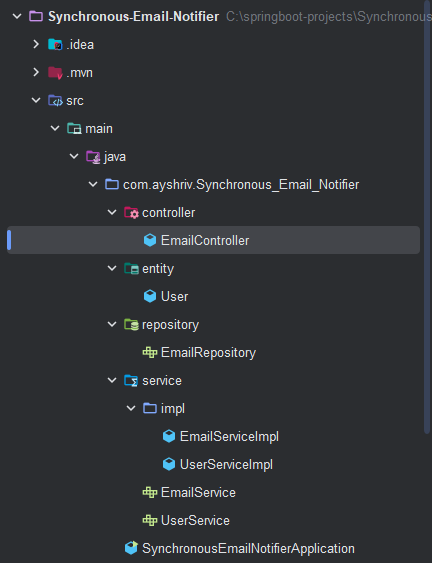
User.java 用于将用户邮件和其他信息存储到数据库中,我们将电子邮件发送给数据库中存在的所有用户。
@Entity
@AllArgsConstructor
@NoArgsConstructor
@Data
public class User {
@Id
@GeneratedValue(strategy = GenerationType.AUTO)
private int id;
private String name;
private String email;
private String phoneNumber;
}
UserService.java
public interface UserService {
public void saveUser(User user);
}
UserServiceImpl.java
public class UserServiceImpl implements UserService {
@Autowired
private UserRepository userRepository;
@Override
public void saveUser(User user) {
userRepository.save(user);
}
}
EmailController.java
@RestController
@RequestMapping("/api/email")
public class EmailController {
@Autowired
EmailService emailService;
@Autowired
UserService userService;
@PostMapping("/saveUser")
public String saveUser(@RequestBody User user) {
userService.saveUser(user);
return "User saved successfully";
}
}
EmailService 接口定义了在 Java 应用程序中发送电子邮件的契约。它包含一个方法sendEmail,该方法接受三个参数:收件人的电子邮件地址(to)、电子邮件主题(subject)和电子邮件内容(body)。实现此接口可以轻松集成电子邮件通知。
package com.ayshriv.Synchronous_Email_Notifier.service;
public interface EmailService {
void sendEmail(String to, String subject,String body);
}
这个EmailServiceImpl类实现了EmailService接口并提供了使用Spring的JavaMailSender发送电子邮件的功能。它使用 SimpleMailMessage 设置收件人 (to)、主题 (subject) 和正文 (text)。 javaMailSender 是使用 Spring 的 @Autowired 注释自动注入的。如果在电子邮件发送过程中出现任何异常,它们会被捕获并记录到控制台。
package com.ayshriv.Synchronous_Email_Notifier.service.impl;
import com.ayshriv.Synchronous_Email_Notifier.service.EmailService;
import org.springframework.beans.factory.annotation.Autowired;
import org.springframework.mail.SimpleMailMessage;
import org.springframework.mail.javamail.JavaMailSender;
import org.springframework.stereotype.Service;
@Service
public class EmailServiceImpl implements EmailService {
@Autowired
private JavaMailSender javaMailSender;
public void sendEmail(String to, String subject,String body)
{
try {
SimpleMailMessage simpleMailMessage=new SimpleMailMessage();
simpleMailMessage.setTo(to);
simpleMailMessage.setSubject(subject);
simpleMailMessage.setText(body);
javaMailSender.send(simpleMailMessage);
}
catch (Exception exception)
{
System.out.println(exception.getMessage());
}
}
}
这个EmailScheduler类是一个Spring服务,它使用计划任务定期向数据库中的所有用户发送电子邮件。该类的工作原理如下:
它使用 @Scheduled 和 cron 表达式(“0 0/1 * 1/1 * ?”)每分钟运行 fetchUsersAndSendEmail 方法。
该方法从 UserRepository 中检索所有用户的列表,并使用 EmailService 向每个用户发送一封电子邮件。
每封发送的电子邮件都有主题“电子邮件演示文本”和正文“演示”。
package com.ayshriv.Synchronous_Email_Notifier.schduler;
import com.ayshriv.Synchronous_Email_Notifier.entity.User;
import com.ayshriv.Synchronous_Email_Notifier.repository.UserRepository;
import com.ayshriv.Synchronous_Email_Notifier.service.EmailService;
import org.springframework.beans.factory.annotation.Autowired;
import org.springframework.scheduling.annotation.Scheduled;
import org.springframework.stereotype.Service;
import java.util.List;
@Service
public class EmailScheduler {
@Autowired
private UserRepository userRepository;
@Autowired
private EmailService emailService;
@Scheduled(cron = "0 0/1 * 1/1 * ?")
public void fetchUsersAndSendEmail()
{
List<User> users = userRepository.findAll();
for (User user:users)
{
emailService.sendEmail(user.getEmail(),"Demo text for email","Demo");
}
}
}
同步电子邮件通知程序项目中的 EmailScheduler 类可按特定时间间隔自动向用户发送营销电子邮件。使用Spring的@Scheduled注释,它每分钟运行一个任务,从UserRepository中检索所有用户并通过EmailService发送电子邮件。此设置非常适合企业自动发送营销电子邮件、新闻通讯或重要通知,无需人工干预。可以使用 cron 表达式调整计划,从而可以灵活地每天、每周或以任何自定义频率发送电子邮件,使其成为基于时间的电子邮件活动的强大工具。
保存用户
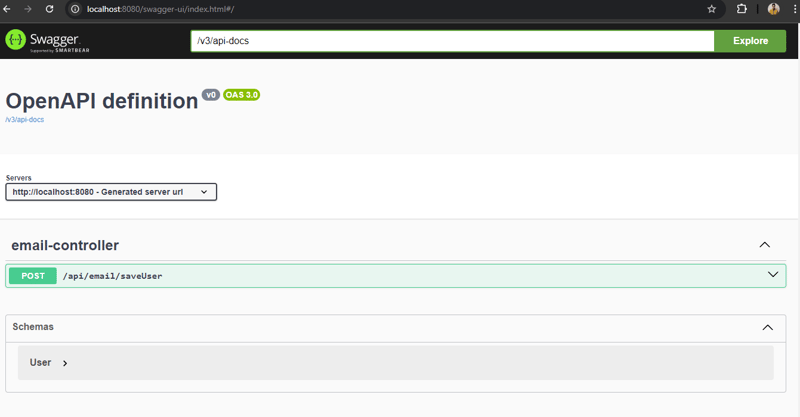
结论
同步电子邮件通知程序项目中的 EmailScheduler 类演示了一种实用且有效的方法来自动执行向用户发送电子邮件的过程。通过利用 Spring Boot 的 @Scheduled 注释和 cron 表达式的灵活性,此类安排电子邮件发送任务每分钟运行一次。 UserRepository 获取所有用户记录,而 EmailService 确保每个用户收到一封包含预定义内容的电子邮件。
这种方法对于营销目的非常有用,企业需要定期发送电子邮件,例如时事通讯、促销优惠或以特定时间间隔发送通知。该设置可确保电子邮件一致地发送给所有用户,无需手动操作。这种自动化减少了沟通过程中涉及的时间和精力,同时使营销人员能够专注于制定有效的营销活动。
自定义这些电子邮件的频率的能力,例如每天、每周或每月发送,使其成为营销活动的多功能工具。此外,您可以动态修改内容,以针对不同用户或场合定制消息传递。总体而言,该解决方案简化了预定营销电子邮件的流程,使其具有可扩展性并能够适应各种业务需求。
您可以在 GitHub 上访问同步电子邮件通知程序项目的完整源代码。 https://github.com/ishrivasayush/email-scheduling-application.git
该项目演示了如何使用 Spring Boot 通过调度程序自动发送营销电子邮件。欢迎探索并贡献!
以上是在 Spring Boot 中构建同步电子邮件通知系统:分步指南的详细内容。更多信息请关注PHP中文网其他相关文章!

